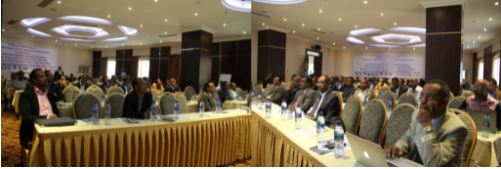A national workshop on “Evidence for Health Action: Research to Policy Divide” was held at Capital Hotel & Spa in Addis Ababa on August 19, 2016. The workshop looked at the link and communication between health researches and policies on health as well as the linkage between health researches and their media reports, and the possibility of creating a formal network whereby the stakeholders of the health sector could converse with each other.

Dr. Fikreab Kebede from Ethiopian Public Health Association (EPHA) gave the keynote speech and he addressed the need for conducting and communicating research findings and reports to the public. He said, “Communication and collaboration between research institutions, researchers, Health Demographic and Surveillance System (HDSS) sites and different stakeholders need to strengthen” if we are to develop the country’s health profile. An issue that was raised with equal importance is the communication between media outlets and their research counterparts. Dr. Firkreab pointed out that “The Ministry of Health (MoH), universities and media should collaborate and disseminate information that is of value to the public and they need to be careful of what they disseminate as well.”
Around half a million people are being addressed through the six HDSS site in the country; and the establishment of a network between these sites would give opportunities for learning and sharing of knowledge, skills and mentorship. This network according to Mr. Fasil Tessema from Jimma University “can create a platform to share the longitudinal data among the six HDSS sites and help researchers with the vital data to address the many health related issues of the country.”

Presentations were made pinpointing the current practices in the country with regard to the integration between health research and policy, health research communication and media, Mother, Newborn and Child Health (MNCH) research to policy practices, information revolution in relation to MNCH, fertility pattern and health service utilization, and child and maternal mortality causes and findings. Representing the Kersa HDSS site which is maintained by Haramaya University, Dr. Nega Assefa presented the “Neonatal, Infant, Under Five and Maternal Mortality and Their Causes” findings from all the HDSS sites around the country.
Panel discussion sessions were held raising issues from the presentations and on current practices in the country. Having a middle ground in prioritization between policy makers and researchers, for both work for the betterment and well-being of the public; striking a balance between basic and scientific research so that the theory and practice of things grows in a parallel manner than one overshadowing the other; identifying the issue of rhetoric and actual communication and opportunity exploitation between the media and research institutes as well as researchers; the lack of airtime and print space for technology, science and health; the capacity of the universities of the country in equipping would-be journalists with the ethics, skill and knowledge of research reporting; the collaboration of and information sharing between the HDSS sites; and active engagement of MoH, Vital Events Registration Agency (VERA), universities, research institutions and the media in the generation, utilization and dissemination of surveillance and research outputs were some of the major discussion points.

At the end of the workshop, recommendations for the way forward were suggested and a two months’ timetable was given for the proposal development of the formal establishment of a network for the research centers operating under universities. Equipping media personnel with the skill and knowledge of the how to’s of research reporting, incentivizing and encouraging researchers and data collectors for the quality and quality of data generation, and diversifying the finding opportunities for HDSS activities were also recommended to continue and integrate the tremendous work the HDSS sites are working.
The workshop was organized by EPHA, MoH, CDC, INDEPTH Network, Save the Children, and HDSS sites under Addis Ababa, Haramaya, Gondar, Jimma, Mekelle and Arba Minch universities, and had more than 70 participants.
